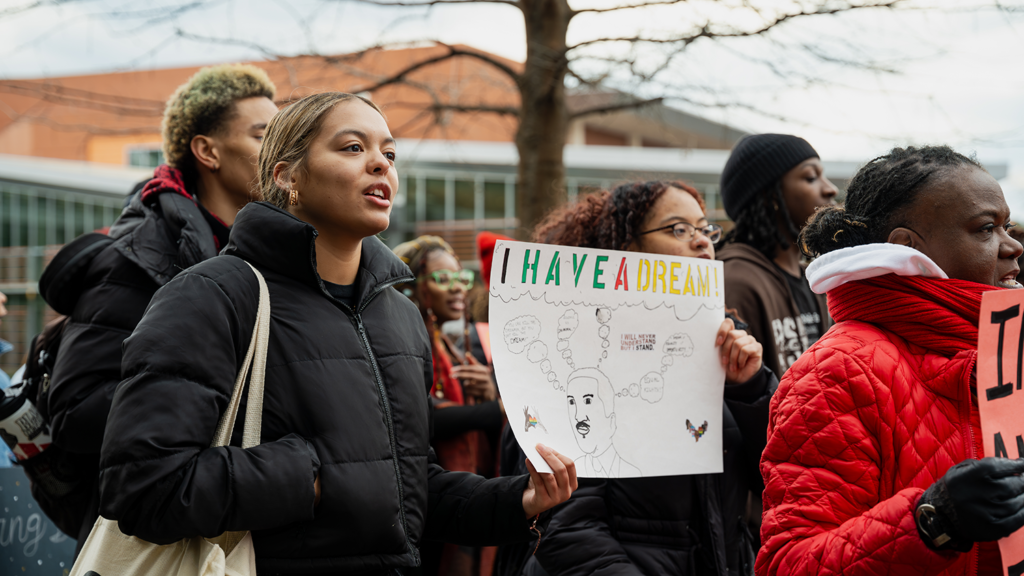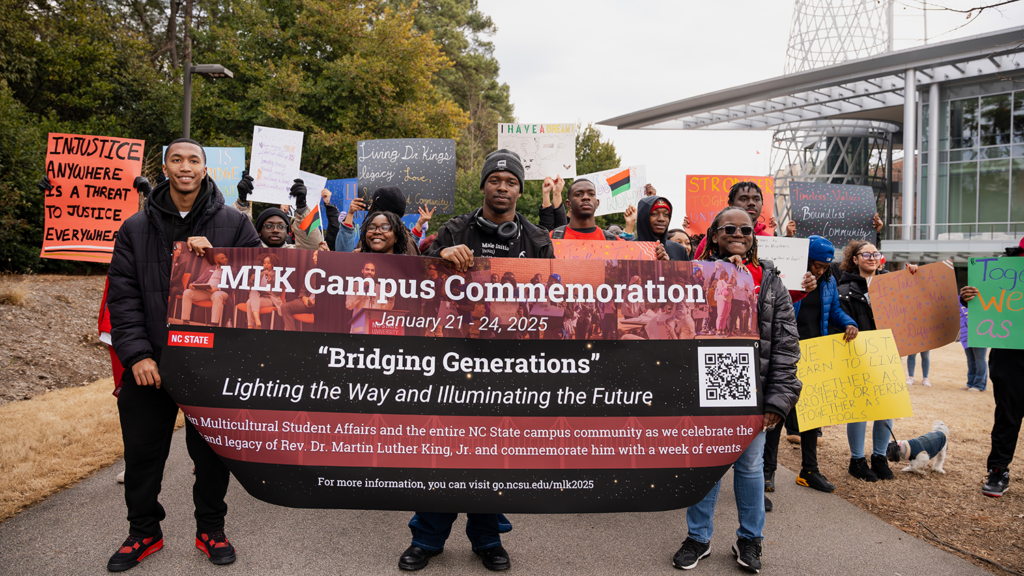Campus Community Celebrates Martin Luther King Jr.’s Legacy with March Like Martin
“March together, march as one! We won’t stop until it’s done! March together, march as one! We won’t stop until it’s done!”
The chant echoed across NC State’s central campus on Friday, Jan. 24 as students, faculty and staff members, alumni and local community members came together to march from Stafford Commons to Harris Field, bearing signs with various messages of unity and common purpose.
The annual “March Like Martin,” hosted by Multicultural Student Affairs (MSA) and the African American Cultural Center (AACC), was the capstone for a week of campus events celebrating the life and legacy of renowned civil rights activist Dr. Martin Luther King Jr.

“It’s very important, because it creates an opportunity for students, faculty, staff, alumni and community members to really do things in unity, do things connected together,” said MSA Director Jameco McKenzie. “In thinking about the mission of Dr. King and the things that he represented, being able to collaborate in this March and walk together, we hoped to embody that and build that bridge connecting generations.”
The week also included an immersive screening of one of King’s speeches in Durham, a keynote panel, arts workshop and more.
Caston Reaves II, a fourth-year student studying mechanical engineering and a village mentor in the Black Male Initiative, was involved with administration of several of these events, and enjoyed seeing the campus community come together to celebrate King’s legacy.
“Everybody has their own story, and we want to bring Dr. King’s story to life,” Reaves said. “We do it through community, and that’s the way that I feel it needs to be done on a lot of campuses.”
Mileah Godette, a third-year student studying biological sciences, explained that in connecting the march, intended to mirror King’s famous march on Washington, DC, with the generations that came before, “it’s not what you do, but how you do it.”
In marching peacefully with signs in support of community and justice, the March perfectly tied into the theme for this year’s MLK Week at NC State, “Bridging Generations: Lighting the Way and Illuminating the Future.”

“It’s beyond important,” Godette said. “It’s not just about what he did for us, but also how it brought us where we are today. It’s a privilege to even be able to attend school together with one another, so allowing us to come together and do something that he did himself allows us to build that foundation and honor his legacy in a unique way. He marched peacefully to allow us to have rights, so being able to use those rights today to do the same thing is something we can’t take for granted.”
Several campus organizations participated in the march, with the Gregg Museum of Art & Design facilitating the creation of the signs, and students from all backgrounds coming together to support the cause.
“I think it helps us see the common experience that everyone has,” McKenzie said. “While everyone’s experience is unique to their own lived experience, I believe the student experience and being able to connect to Dr. King in whatever way made sense for them was really important to help everyone on campus from all different backgrounds feel a connection to his message and to the goals of Dr. King.”
After the march, participants sought the warmth of the AACC in Witherspoon Student Center to enjoy some refreshments and a speech from Jaida Ellis, a graduate student in the Master of Social Work program, followed by a special performance from pianist Matthew Whitaker through NC State LIVE.
Ellis delivered powerful remarks tying to both the past and future. She spoke about her great grandfather, who was the victim of a racially-related murder, and what her grandfather’s life could have been like if not for losing his father at such a young age.
However, her tone quickly shifted towards the principles of Afrofuturism and optimism for the future.
“To me, to be Black, to be a person of any marginalized identity, is to hold radical optimism in your heart,” Ellis said. “It is to understand that you are here today because your ancestors believed in a future where you too could pursue life, liberty and the pursuit of happiness. They believed in it so much that they were willing to fight, and in some cases die for it – to light the way for the future.”
Ellis said she felt a “whirlwind of emotions” while writing her speech, and thought about her family members, teachers and other influential people in her life who remembered King’s time and the Civil Rights Movement, and the stories they shared with her about it.
However, she emphasized that the biggest message she wanted the audience to take from her speech was that radical optimism for the future, telling the listeners that “our ancestors did more with less than what we have today to hold space for the radical idea of seeing us going farther than their mind’s eye, to go boldly where no man has gone before.”
“I think even with the last decade and when we take that into consideration, there’s been a lot of moments of doomerism, or people just thinking it’s never going to get better,” Ellis said. “I wanted to help people understand and feel more connected to understand that this isn’t the first time that the world has changed, but we always persevere through community, empathy and caring for one another.”
The speech and musical performance capped the week of tributes to King, with the chant “March together, march as one! We won’t stop until it’s done!,” crafted by AACC Graduate Assistant Keira Moore, intended to both celebrate that legacy and highlight the work that still lies ahead.
“The idea of ‘it’s done’ is really a journey,” McKenzie said. “It’s never really done, because we’re always creating more opportunities and more space for everyone to feel a sense of belonging. So we’re thinking about how we can collectively move forward together.”